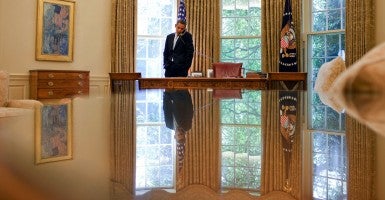Not a day off since Christmas. The president deserved a real vacation — to sit on the newly screened back porch, daydream for an afternoon, then enjoy a quiet supper.
All was well … until the phone rang that night. “Mr. President,” said Secretary of State Dean Acheson, “I have very serious news. The North Koreans have invaded South Korea.”
Harry Truman’s summer break in Independence, Mo., came to a screeching halt. Within days, he ordered American troops into the fight. The Korean War had begun.
No one should fault any president for trying to take time off. On the other hand, presidents know full well what they’ve signed up for. The Oval Office is not just a day job.
As he boarded the helicopter for Martha’s Vineyard, President Obama acknowledged that he would have to do a lot of homework during the break. After all, Iraq was melting down.
“I don’t think we’re going to solve this problem in weeks,” said President Obama. “This is going to be a long-term project.”
Bedlam in Baghdad, however, is only one of the many issues pressing on the president. Another one that requires a lot of thinking about long-term strategy is what to do about Moscow. Even if Putin doesn’t try to slice off more territory from Ukraine, another round of Russia-generated crises in that part of the world is all but inevitable.
Russian natural gas supplies still transit through Ukraine. Normally at this time of the year, Northern European nations are stockpiling energy supplies for the coming winter, which starts in October. But that’s not happening. A European fuel shortage seems inevitable — and that will lead to much nastiness. Moscow will accuse the Ukrainians of stealing gas. Kiev will blame Moscow for manufacturing the emergency.
If the White House is to help keep that crisis-in-waiting from blowing up, it must first acknowledge that Russian President Vladimir Putin is a thoroughly unreliable strategic partner, and that sanctions alone won’t get the job done.
Naming, shaming, and punishing Putin’s pals and flunkies with sanctions have only limited effects. The Russian economy is integrated with the West, which makes imposing broad economic sanctions much like scratching an itch. The more you scratch, the more inflamed and irritated everything gets — and it cures nothing.
Before coming back from the beach, the president should put in place three pillars of a new policy. They may not resolve the crisis over the Ukraine, but they would go a long way toward putting Putin in his place and putting relations between Russia and the West on a predictable and stable course.
First, a sound strategy has to start with pushing a free-market energy policy now. For example, announcing that the United States will loosen all restrictions on natural gas exports would jolt the market and put Russia on notice that its power to bully Europe by threatening to withhold energy is on the wane.
Second, the United States needs to get back into the information war. Moscow is peddling lies to its own people, Russian-speaking populations in Western Europe, and anyone else around the world who will listen. Meanwhile, Putin is making an unprecedented effort to silence dissenting voices by placing new restrictions on Internet access in Russia. America’s voice has been muted far too long. That must change.
Third, Washington needs to make the prospect of escalating conflict far less appealing to Moscow. That means establishing a strong presence in Europe with conventional forces, a modern nuclear force, and comprehensive missile defense.
Originally appeared in the Washington Examiner
































